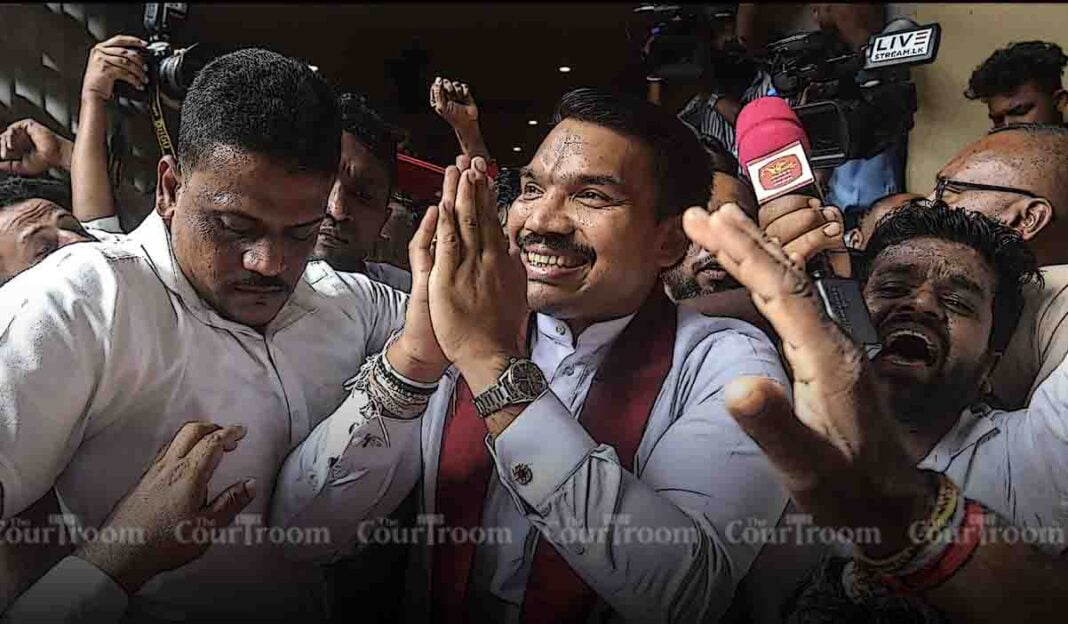Namal Rajapaksa Enters Presidential Race as Sri Lankan Election Takes Shape
When Namal Rajapaksa received an unexpected call from his father, former President Mahinda Rajapaksa, the 38-year-old lawmaker was taken aback. Mahinda urged Namal to run for the presidency, a decision prompted by the island nation’s richest individual, Dhammika Perera, withdrawing his candidacy for the upcoming election scheduled for September 21. Initially silent, Namal ultimately accepted the challenge, marking his bid as the third Rajapaksa to vie for the highest office in Sri Lanka. If successful, he will join his father Mahinda and uncle Gotabaya as the third member of the Rajapaksa family to lead the country in the past 19 years.
Following the unrest of 2022, which led to the resignations of Mahinda and Gotabaya as prime minister and president respectively, their party, the Sri Lanka Podujana Peramuna (SLPP), saw Ranil Wickremesinghe appointed first as prime minister and later as president. Under Wickremesinghe’s leadership, Sri Lanka has navigated a severe economic crisis and is now on the path to recovery.
Wickremesinghe, a seasoned politician, had anticipated support from the Rajapaksa faction in this election. However, Namal and his uncle Basil’s refusal to back Wickremesinghe, along with a significant defection of SLPP MPs to his side, complicated matters. The disagreement was partly due to their discomfort with Perera’s potential candidacy on the SLPP ticket.
Mahinda Rajapaksa justified Namal’s candidacy by stating, “The Aragalaya asked for a young leader, so we have presented a young leader.” Namal’s unexpected nomination has transformed the election into a competitive four-way race. In addition to Namal and Wickremesinghe, opposition leader Sajith Premadasa and JVP leader Anura Kumara Dissanayaka are also contenders, making this one of the most challenging elections in Sri Lankan history.
Dissanayaka, known as AKD, is optimistic about his chances, arguing that the electorate is disillusioned with the current political establishment. Premadasa hopes to leverage his anti-establishment stance and personal image to secure victory. Meanwhile, Wickremesinghe believes that his efforts to stabilize the country merit public support.
Namal, the youngest candidate, faces significant hurdles. His party is experiencing internal strife and public indifference, and insiders acknowledge that a presidential victory in his first attempt may be improbable. Instead, the focus is on securing a strong performance in the parliamentary elections that follow, which could position him as a potential prime minister or leader of the opposition, thereby preserving his party’s influence and his family’s legacy.
An MP since 2010 and a former Cabinet minister, Namal won his 2020 parliamentary seat in the Hambantota district by a substantial margin. Educated in law in both England and Sri Lanka, he is also a former national Rugby captain. Married to Limini Weerasinghe with two sons, Namal has recently taken over as the SLPP’s national organizer, a key party position.
Although he had previously planned to wait until his mid-40s to enter the presidential race, Namal now faces an accelerated timeline. His candidacy, whether successful or not, will significantly impact Sri Lankan politics and his own future in the national arena.
(With inputs from agency)
Share your news, articles, deals, columns, or press releases with us! Click the link to submit and join our platform today.


